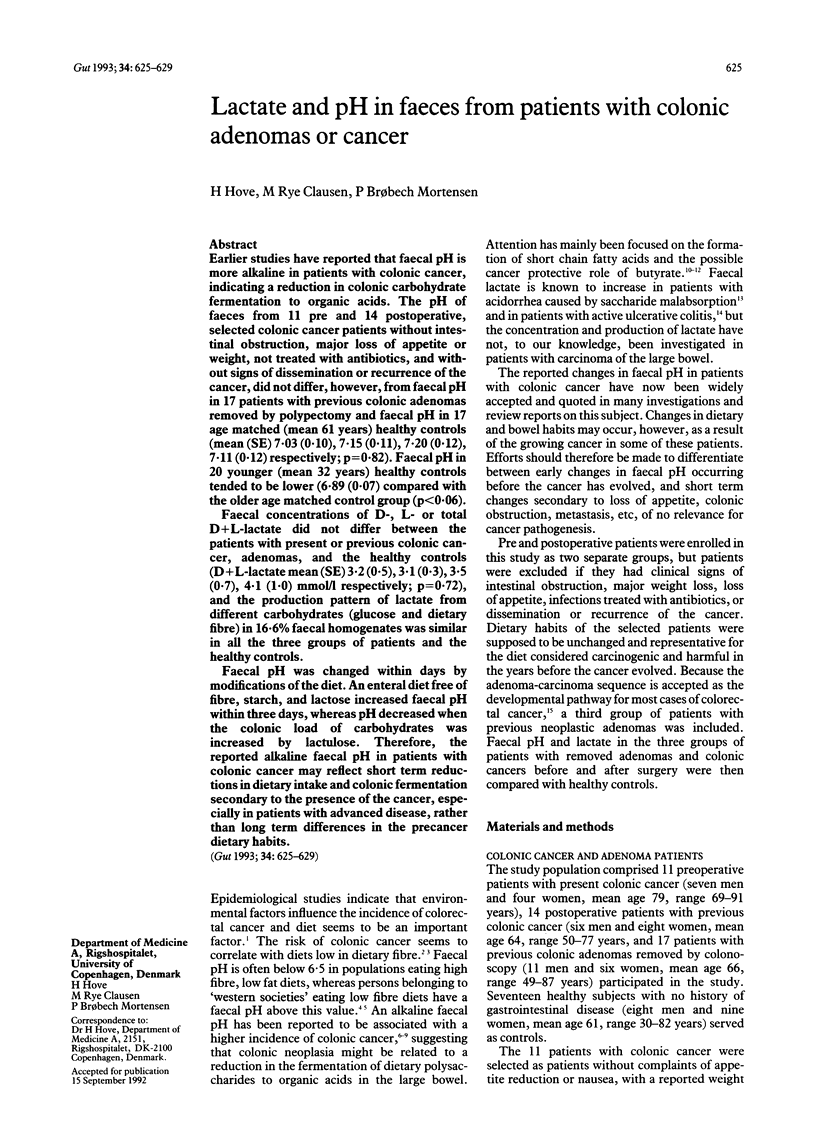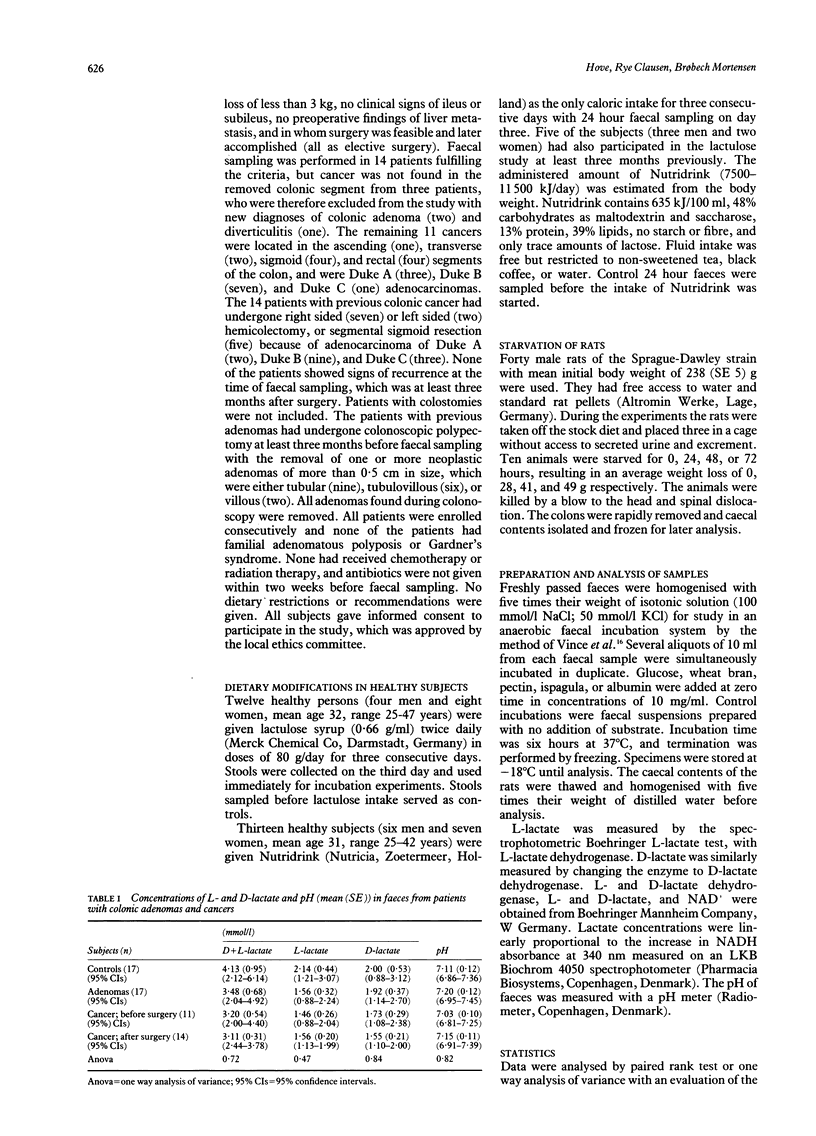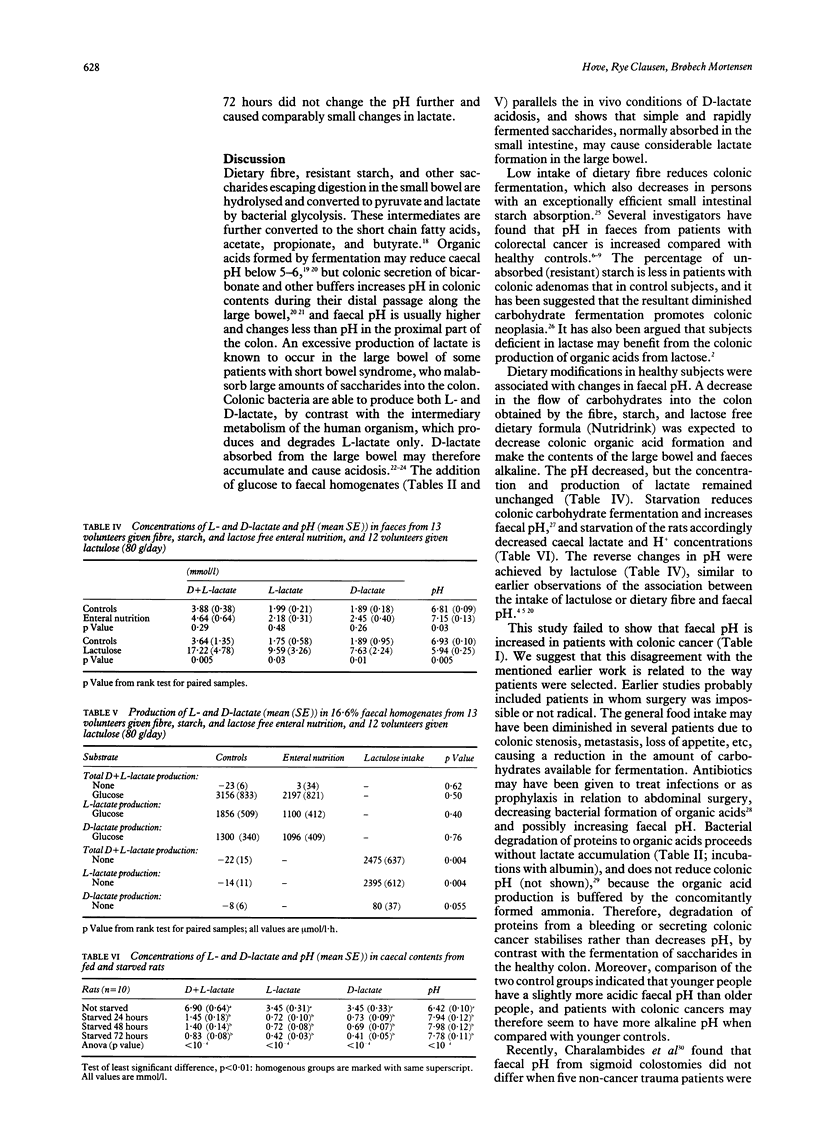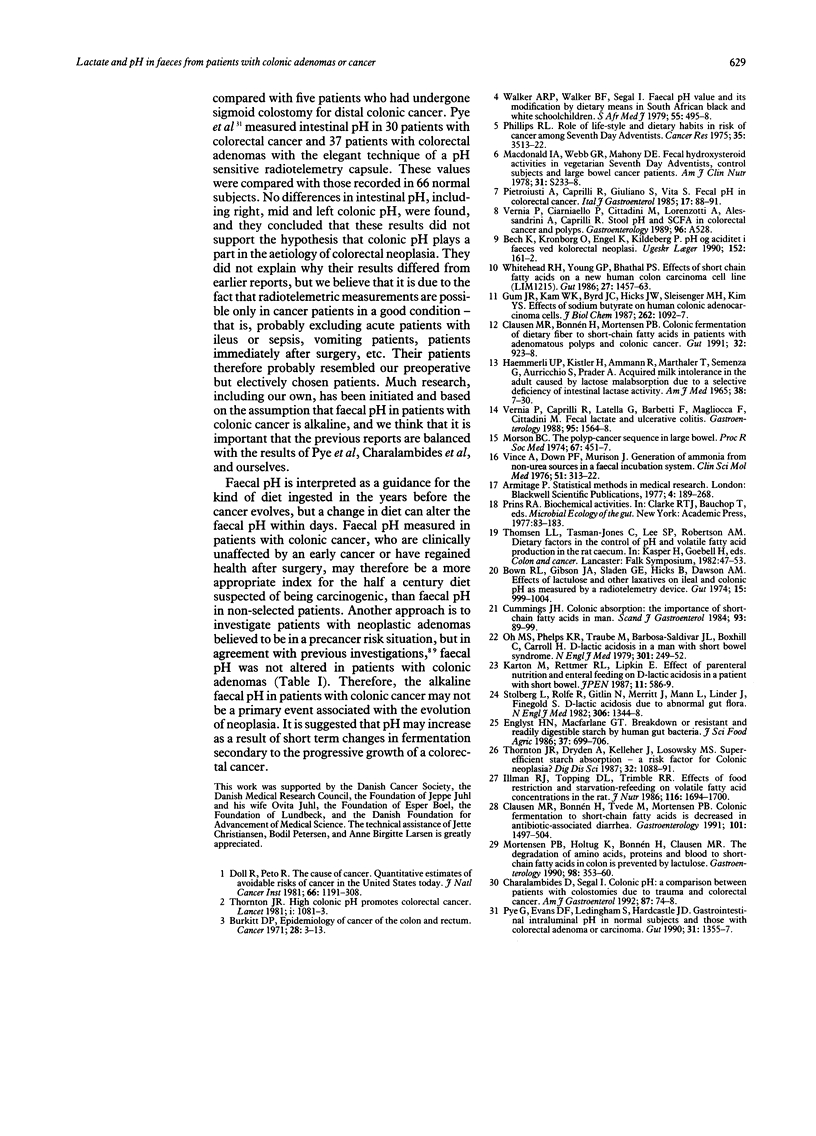Abstract
Earlier studies have reported that faecal pH is more alkaline in patients with colonic cancer, indicating a reduction in colonic carbohydrate fermentation to organic acids. The pH of faeces from 11 pre and 14 postoperative, selected colonic cancer patients without intestinal obstruction, major loss of appetite or weight, not treated with antibiotics, and without signs of dissemination or recurrence of the cancer, did not differ, however, from faecal pH in 17 patients with previous colonic adenomas removed by polypectomy and faecal pH in 17 age matched (mean 61 years) healthy controls (mean (SE) 7.03 (0.10), 7.15 (0.11), 7.20 (0.12), 7.11 (0.12) respectively; p = 0.82). Faecal pH in 20 younger (mean 32 years) healthy controls tended to be lower (6.89 (0.07) compared with the older age matched control group (p < 0.06). Faecal concentrations of D-, L- or total D+L-lactate did not differ between the patients with present or previous colonic cancer, adenomas, and the healthy controls (D+L-lactate mean (SE) 3.2 (0.5), 3.1 (0.3), 3.5 (0.7), 4.1 (1.0) mmol/l respectively; p = 0.72), and the production pattern of lactate from different carbohydrates (glucose and dietary fibre) in 16.6% faecal homogenates was similar in all the three groups of patients and the healthy controls. Faecal pH was changed within days by modifications of the diet. An enteral diet free of fibre, starch, and lactose increased faecal pH within three days, whereas pH decreased when the colonic load of carbohydrates was increased by lactulose. Therefore, the reported alkaline faecal pH in patients with colonic cancer may reflect short term reduction in dietary intake and colonic fermentation secondary to the presence of the cancer, especially in patients with advanced disease, rather than long term differences in the precancer dietary habits.
Full text
PDF




Selected References
These references are in PubMed. This may not be the complete list of references from this article.
- Bech K., Kronborg O., Engel K., Kildeberg P. pH og aciditet i faeces ved kolorektal neoplasi. Ugeskr Laeger. 1990 Jan 15;152(3):161–162. [PubMed] [Google Scholar]
- Bown R. L., Gibson J. A., Sladen G. E., Hicks B., Dawson A. M. Effects of lactulose and other laxatives on ileal and colonic pH as measured by a radiotelemetry device. Gut. 1974 Dec;15(12):999–1004. doi: 10.1136/gut.15.12.999. [DOI] [PMC free article] [PubMed] [Google Scholar]
- Burkitt D. P. Epidemiology of cancer of the colon and rectum. Cancer. 1971 Jul;28(1):3–13. doi: 10.1002/1097-0142(197107)28:1<3::aid-cncr2820280104>3.0.co;2-n. [DOI] [PubMed] [Google Scholar]
- Charalambides D., Segal I. Colonic pH: a comparison between patients with colostomies due to trauma and colorectal cancer. Am J Gastroenterol. 1992 Jan;87(1):74–78. [PubMed] [Google Scholar]
- Clausen M. R., Bonnén H., Mortensen P. B. Colonic fermentation of dietary fibre to short chain fatty acids in patients with adenomatous polyps and colonic cancer. Gut. 1991 Aug;32(8):923–928. doi: 10.1136/gut.32.8.923. [DOI] [PMC free article] [PubMed] [Google Scholar]
- Clausen M. R., Bonnén H., Tvede M., Mortensen P. B. Colonic fermentation to short-chain fatty acids is decreased in antibiotic-associated diarrhea. Gastroenterology. 1991 Dec;101(6):1497–1504. doi: 10.1016/0016-5085(91)90384-w. [DOI] [PubMed] [Google Scholar]
- Cummings J. H. Colonic absorption: the importance of short chain fatty acids in man. Scand J Gastroenterol Suppl. 1984;93:89–99. [PubMed] [Google Scholar]
- Doll R., Peto R. The causes of cancer: quantitative estimates of avoidable risks of cancer in the United States today. J Natl Cancer Inst. 1981 Jun;66(6):1191–1308. [PubMed] [Google Scholar]
- Gum J. R., Kam W. K., Byrd J. C., Hicks J. W., Sleisenger M. H., Kim Y. S. Effects of sodium butyrate on human colonic adenocarcinoma cells. Induction of placental-like alkaline phosphatase. J Biol Chem. 1987 Jan 25;262(3):1092–1097. [PubMed] [Google Scholar]
- HAEMMERLI U. P., KISTLER H., AMMANN R., MARTHALER T., SEMENZA G., AURICCHIO S., PRADER A. ACQUIRED MILK INTOLERANCE IN THE ADULT CAUSED BY LACTOSE MALABSORPTION DUE TO A SELECTIVE DEFICIENCY OF INTESTINAL LACTASE ACTIVITY. Am J Med. 1965 Jan;38:7–30. doi: 10.1016/0002-9343(65)90156-7. [DOI] [PubMed] [Google Scholar]
- Illman R. J., Topping D. L., Trimble R. P. Effects of food restriction and starvation-refeeding on volatile fatty acid concentrations in the rat. J Nutr. 1986 Sep;116(9):1694–1700. doi: 10.1093/jn/116.9.1694. [DOI] [PubMed] [Google Scholar]
- Karton M., Rettmer R. L., Lipkin E. W. Effect of parenteral nutrition and enteral feeding on D-lactic acidosis in a patient with short bowel. JPEN J Parenter Enteral Nutr. 1987 Nov-Dec;11(6):586–589. doi: 10.1177/0148607187011006586. [DOI] [PubMed] [Google Scholar]
- Macdonald I. A., Webb G. R., Mahony D. E. Fecal hydroxysteroid dehydrogenase activities in vegetarian Seventh-Day Adventists, control subjects, and bowel cancer patients. Am J Clin Nutr. 1978 Oct;31(10 Suppl):S233–S238. doi: 10.1093/ajcn/31.10.S233. [DOI] [PubMed] [Google Scholar]
- Morson B. President's address. The polyp-cancer sequence in the large bowel. Proc R Soc Med. 1974 Jun;67(6 Pt 1):451–457. doi: 10.1177/00359157740676P115. [DOI] [PMC free article] [PubMed] [Google Scholar]
- Mortensen P. B., Holtug K., Bonnén H., Clausen M. R. The degradation of amino acids, proteins, and blood to short-chain fatty acids in colon is prevented by lactulose. Gastroenterology. 1990 Feb;98(2):353–360. doi: 10.1016/0016-5085(90)90825-l. [DOI] [PubMed] [Google Scholar]
- Oh M. S., Phelps K. R., Traube M., Barbosa-Saldivar J. L., Boxhill C., Carroll H. J. D-lactic acidosis in a man with the short-bowel syndrome. N Engl J Med. 1979 Aug 2;301(5):249–252. doi: 10.1056/NEJM197908023010505. [DOI] [PubMed] [Google Scholar]
- Phillips R. L. Role of life-style and dietary habits in risk of cancer among seventh-day adventists. Cancer Res. 1975 Nov;35(11 Pt 2):3513–3522. [PubMed] [Google Scholar]
- Pye G., Evans D. F., Ledingham S., Hardcastle J. D. Gastrointestinal intraluminal pH in normal subjects and those with colorectal adenoma or carcinoma. Gut. 1990 Dec;31(12):1355–1357. doi: 10.1136/gut.31.12.1355. [DOI] [PMC free article] [PubMed] [Google Scholar]
- Stolberg L., Rolfe R., Gitlin N., Merritt J., Mann L., Jr, Linder J., Finegold S. d-Lactic acidosis due to abnormal gut flora: diagnosis and treatment of two cases. N Engl J Med. 1982 Jun 3;306(22):1344–1348. doi: 10.1056/NEJM198206033062207. [DOI] [PubMed] [Google Scholar]
- Thornton J. R., Dryden A., Kelleher J., Losowsky M. S. Super-efficient starch absorption. A risk factor for colonic neoplasia? Dig Dis Sci. 1987 Oct;32(10):1088–1091. doi: 10.1007/BF01300193. [DOI] [PubMed] [Google Scholar]
- Thornton J. R. High colonic pH promotes colorectal cancer. Lancet. 1981 May 16;1(8229):1081–1083. doi: 10.1016/s0140-6736(81)92244-3. [DOI] [PubMed] [Google Scholar]
- Vernia P., Caprilli R., Latella G., Barbetti F., Magliocca F. M., Cittadini M. Fecal lactate and ulcerative colitis. Gastroenterology. 1988 Dec;95(6):1564–1568. doi: 10.1016/s0016-5085(88)80078-7. [DOI] [PubMed] [Google Scholar]
- Vince A., Down P. F., Murison J., Twigg F. J., Wrong O. M. Generation of ammonia from non-urea sources in a faecal incubation system. Clin Sci Mol Med. 1976 Sep;51(3):313–322. doi: 10.1042/cs0510313. [DOI] [PubMed] [Google Scholar]
- Walker A. R., Walker B. F., Segal I. Faecal pH value and its modification by dietary means in South African black and white schoolchildren. S Afr Med J. 1979 Mar 24;55(13):495–498. [PubMed] [Google Scholar]
- Whitehead R. H., Young G. P., Bhathal P. S. Effects of short chain fatty acids on a new human colon carcinoma cell line (LIM1215). Gut. 1986 Dec;27(12):1457–1463. doi: 10.1136/gut.27.12.1457. [DOI] [PMC free article] [PubMed] [Google Scholar]


